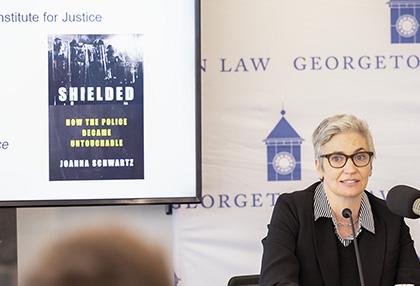Joanna Schwartz earns high-level honors for her work on police accountability

Joanna Schwartz, a UCLA School of Law professor and one of the country’s leading authorities on police accountability and civil rights law, has earned significant attention from the judiciary and legal professionals for her scholarship and thought leadership in the field.
On May 20, a federal judge relied heavily on her work in a sweeping legal decision where he found that qualified immunity – the doctrine that often protects government officials from liability when they are sued for violating people’s rights – is unsupportable. And on May 22, her recent book Shielded: How the Police Became Untouchable (Viking, 2023) won the American Bar Association’s Silver Gavel Award for excellence in the media and the arts.
Schwartz is a professor of law and the faculty director of UCLA Law’s David J. Epstein Program for Public Interest Law and Policy. A former civil rights attorney, she has been a member of the UCLA Law faculty since 2006, and she won UCLA’s highest teaching honor, the Distinguished Teaching Award, in 2015. Among her areas of expertise is the doctrine of qualified immunity, which she has written and spoken about in numerous publications and media appearances.
The U.S. Supreme Court created qualified immunity in 1967 to protect government officials when they are sued for abusing their power, partly in the interest of minimizing the strain on courts that could be flooded with civil rights actions. It is at the core of many cases in which police officers and others in authority avoid accountability for their misconduct. But Schwartz has found in her cutting-edge research that the costs far outweigh possible benefits.
In the current case of Green v. Thomas, Judge Carlton Reeves of the U.S. District Court for the Southern District of Mississippi denied qualified immunity to a detective who caused a man to be falsely accused of capital murder. But he went further in his 62-page order. Schwartz says that Reeves continued to assert that, “qualified immunity is unsupportable as a matter of history, text and policy. He additionally argues that any concerns about overturning settled law – referred to as stare decisis – ring hollow after the [Supreme] Court’s decision in Dobbs [v. Jackson Women’s Health Organization], overturning Roe v. Wade.”
In doing so, Reeves cited the research and arguments that Schwartz has presented in several of her publications on the topic, including “How Qualified Immunity Fails” (Yale Law Journal, 2017), “The Case Against Qualified Immunity” (Notre Dame Law Review, 2018) and “Qualified Immunity’s Boldest Lie” (University of Chicago Law Review, 2021). He wrote, “Professor Schwartz’s research indicates that ‘qualified immunity is not achieving its policy objectives’ and ‘may, in fact, increase the costs and delays associated with constitutional litigation.’”
The value of Schwartz’s scholarship was further highlighted when, just two days later, the ABA announced that she won the Silver Gavel award for her book Shielded. According to the ABA, the award recognizes “outstanding work that fosters the American public’s understanding of law and the legal system. This is the ABA’s highest honor in recognition of this purpose.”
This year, “the ABA is presenting nine Silver Gavels and four Honorable Mentions among 29 finalists identified from 176 entries received in all eligible categories, which include books, commentary, documentaries, drama and literature, magazines, multimedia, newspapers, radio and television.” Other winners include Martin Scorsese’s movie Killers of the Flower Moon and projects that focus on “politics and the Supreme Court, a state response to voters, conspiracy, genocide, murder, democracy, guardianship and mental illness.”
“I am over the moon,” Schwartz says. “To earn these honors is incredibly gratifying. Even more, I hope that these accolades can help shine a brighter light on the terrible impact that qualified immunity and the broad lack of accountability for police misconduct has on people across the country and the American justice system as a whole.”
Read a Q&A with Schwartz about her book and police accountability.